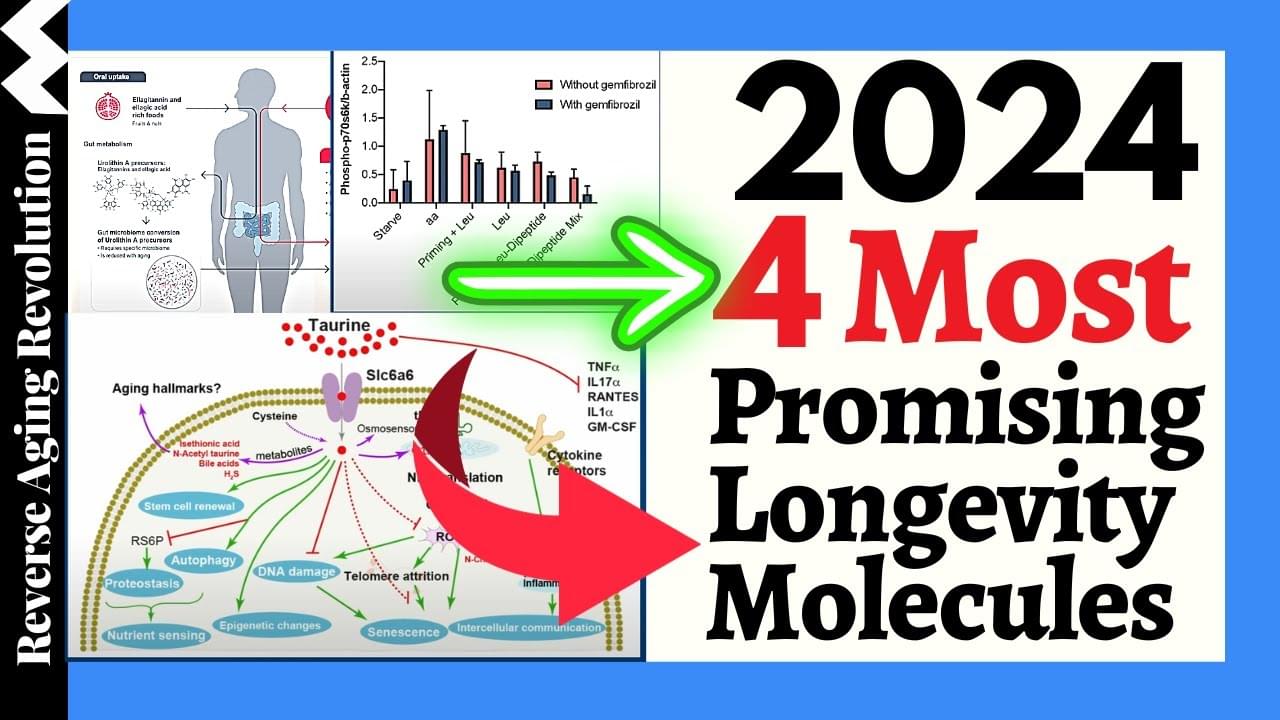Dec 25, 2023
The Body, Not the Brain, Regulates Sleep
Posted by Arthur Brown in categories: genetics, neuroscience
Genetic screens have revealed three peripheral tissue genes that regulate sleep. What does this mean for sleep research?
Genetic screens have revealed three peripheral tissue genes that regulate sleep. What does this mean for sleep research?

Robert Sapolsky is one of the world’s leading neuroscientists, with a focus on the physiological effects of stress. (For years, he spent his summers in Kenya, alone except for the baboons he was observing.) Steve asks Robert why we value human life over animals, why he’s lost faith in the criminal justice system, and how to look casual when you’re about to blow-dart a very large and potentially unhappy primate.\
\
This episode was originally published March 5, 2021.\
For a full transcript, resources, and more, visit: https://freak.ws/3WQAjmF\
\
ABOUT PEOPLE I (MOSTLY) ADMIRE:\
People I (Mostly) Admire is hosted by Steven Levitt, the unorthodox University of Chicago economist and co-author of the Freakonomics book series, who tracks down other high achievers and asks questions that only he would think to ask. Guests include all-time Jeopardy! champion (and now host) Ken Jennings, YouTube C.E.O. Susan Wojcicki, W.N.B.A. champion Sue Bird, Operation Warp Speed chief Moncef Slaoui, and neuroscientist/actress (also now Jeopardy! host) Mayim Bialik. Winner of Adweek‘s 2021 Best Interview Podcast of the Year.\
\
SUBSCRIBE TO PEOPLE I (MOSTLY) ADMIRE:\
YouTube: https://freak.ws/3yIl6dl\
Stitcher: https://freak.ws/3ENOP8v\
Apple Podcasts: https://freak.ws/3ELfGST\
Spotify: https://freak.ws/3D6uqKV\
\
ABOUT FREAKONOMICS RADIO NETWORK:\
Freakonomics began as a book, which led to a blog, a documentary film, more books, a pair of pants, and in 2010, a podcast called Freakonomics Radio. Hosted by Stephen J. Dubner, it’s one of the most popular podcasts in the world, with a reputation for storytelling that is both rigorous and entertaining. Its archive of more than 500 episodes is available, for free, on any podcast app, and the show airs weekly on NPR stations. Freakonomics Radio is now the flagship show of the Freakonomics Radio Network, which includes the podcasts No Stupid Questions (est. 2020), People I (Mostly) Admire (2020), and Freakonomics, M.D. (2021). \
\
FREAKONOMICS RADIO NETWORK PODCASTS:\
Freakonomics Radio: https://freakonomics.com/series/freak…\
No Stupid Questions: https://freakonomics.com/series/nsq/\
People I (Mostly) Admire: https://freakonomics.com/series/peopl…\
Freakonomics, M.D.: https://freakonomics.com/series/bapu/\
Special series: https://freakonomics.com/topics/\
\
00:00 Robert Sapolsky bio\
01:37 Baboon research in Kenya\
3:03 Baboon social rank and health\
4:14 Blow-dart sedation challenges\
7:40 Why human and animal stress are similar\
11:09 Why Sapolsky only studied male baboons\
12:42 Affiliation vs. rank in baboons\
14:08 Tragic end of research with first baboon troop\
17:38 Why humans prioritize human lives\
19:25 How humans prioritize pets\
19:47 Prioritization of tigers in India\
21:00 Harambe the gorilla\
22:19 Chronic stress research\
25:08 Ways to respond to stress\
26:00 Genetic influence on stress\
26:45 ACE score to quantify stress\
28:49 Addressing PTSD to reduce crime\
29:35 Behave-Sapolsky book on violence\
29:56 Free will and violence\
30:35 Abolishment of criminal justice system\
30:54 The frontal cortex and impulse control\
31:31 Frontal cortex trauma in death row inmates\
32:29 Purposes of punishment\
32:46 Retribution\
32:59 Incapacitation and deterrence\
33:35 Quarantine model of punishment\
34:10 “Biological luck” in blame and reward\
34:51 Epilepsy, schizophrenia, and dyslexia misunderstood\
37:06 How to be a better storyteller.
Breaking link between early, late stages of disease may prevent dementia.
Alzheimer’s disease has plagued one large Colombian family for generations, striking down half of its members in the prime of life. But one member of that family evaded what had seemed would be fate: Despite inheriting the genetic defect that caused her relatives to develop dementia in their 40s, she stayed cognitively healthy into her 70s.
Study Reveals Protective Gene Mutation

The Genetic Revolution is a compelling science documentary that invites viewers into the groundbreaking world of DNA manipulation and genetic engineering. This intriguing documentary showcases the innovative science behind genetic modifications and chronicles a diverse team of scientists from around the world as they utilize advanced DNA editing technologies like CRISPR in ways previously deemed unthinkable.\
With its exploration into the rapidly evolving science of DNA editing, \.
Primates are among the most intelligent creatures with distinct cognitive abilities. Their brains are relatively large in relation to their body stature and have a complex structure. However, how the brain has developed over the course of evolution and which genes are responsible for the high cognitive abilities is still largely unclear. The better our understanding of the role of genes in brain development, the more likely it will be that we will be able to develop treatments for serious brain diseases.
Researchers are approaching these questions by knocking out or activating individual genes and thus drawing conclusions about their role in brain development. To avoid animal experiments as far as possible, brain organoids are used as an alternative. These three-dimensional cell structures, which are only a few millimeters in size, reflect different stages of brain development and can be genetically modified. However, such modifications are usually very complex, lengthy and costly.
Researchers at the German Primate Center (DPZ)—Leibniz Institute for Primate Research in Göttingen have now succeeded in genetically manipulating brain organoids quickly and effectively. The procedure requires only a few days instead of the usual several months and can be used for organoids of different primate species. The brain organoids thus enable comparative studies of the function of genes at early stages of brain development in primates and help to better understand neurological diseases.

Full Video of the NeuroTechnolgy Center at Columbia University’s Optogenetics 2020 WebinarQ&A Transcript: tinyurl.com/yajfeozsTable of Contents:00:00:00 — In…
Aging Cell is an open access geroscience journal addressing the biology of aging, from molecular mechanisms of aging to age-related disease.
2023 was the year that CRISPR gene-editing sliced its way out of the lab and into the public consciousness—and American medical system. The Food and Drug Administration recently approved the first gene-editing CRISPR therapy, Casgevy (or exa-cel), a treatment from CRISPR Therapeutics and partner Vertex for patients with sickle cell disease. This comes on the heels of a similar green light by U.K. regulators in a historic moment for a gene-editing technology whose foundations were laid back in the 1980s, eventually resulting in a 2020 Nobel Prize in Chemistry for pioneering CRISPR scientists Jennifer Doudna and Emmanuelle Charpentier.
That decades-long gap between initial scientific spark, widespread academic recognition, and now the market entry of a potential cure for blood disorders like sickle cell disease that afflict hundreds of thousands of people around the world is telling. If past is prologue, even newer CRISPR gene-editing approaches being studied today have the potential to treat diseases ranging from cancer and muscular dystrophy to heart disease, birth more resilient livestock and plants that can grapple with climate change and new strains of deadly viruses, and even upend the energy industry by tweaking bacterial DNA to create more efficient biofuels in future decades. And novel uses of CRISPR, with assists from other technologies like artificial intelligence, might fuel even more precise, targeted gene-editing—in turn accelerating future discovery with implications for just about any industry that relies on biological material, from medicine to agriculture to energy.
With new CRISPR discoveries guided by AI, specifically, we can expand the toolbox available for gene editing, which is crucial for therapeutic, diagnostic, and research applications… but also a great way to better understand the vast diversity of microbial defense mechanisms, said Feng Zhang, another CRISPR pioneer, molecular biologist, and core member at the Broad Institute of MIT and Harvard in an emailed statement to Fast Company.

7 month treatment, 6 years returned according to a methylation clock, mostly in people who’s biological age was greater than their calendar age.
Dr. Brian Kennedy presents 4 molecules which show promising effects in both healthspan & lifespan in this video. https://pubmed.ncbi.nlm.nih.gov/37289866/http… https://pubmed.ncbi.nlm.nih.gov/37637… https://pubmed.ncbi.nlm.nih.gov/37925… https://pubmed.ncbi.nlm.nih.gov/35584… https://pubmed.ncbi.nlm.nih.gov/35050… https://pubmed.ncbi.nlm.nih.gov/28199… https://pubmed.ncbi.nlm.nih.gov/37904… https://pubmed.ncbi.nlm.nih.gov/37697… https://pubmed.ncbi.nlm.nih.gov/37217… https://pubmed.ncbi.nlm.nih.gov/34952… https://pubmed.ncbi.nlm.nih.gov/34847…
Continue reading “4 MOST Promising Longevity Molecules You NEED To Know” »
